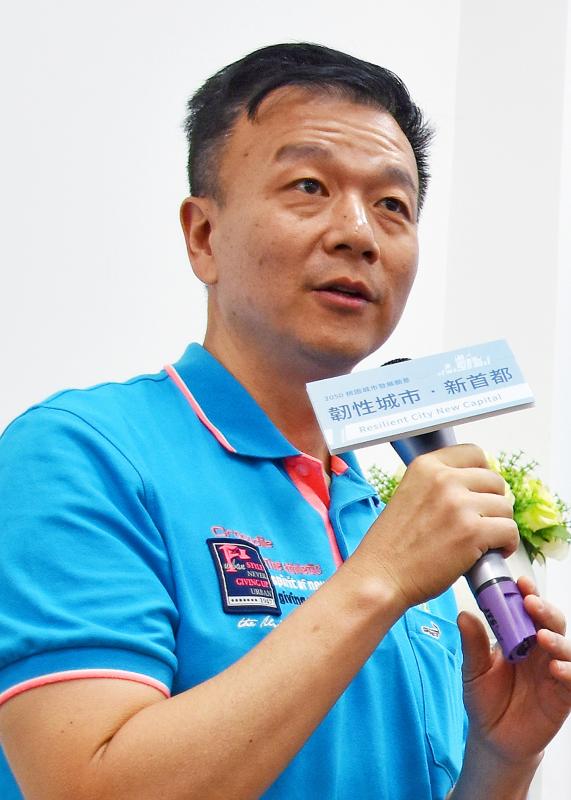Retired army general Yu Pei-chen (于北辰) on Friday said that he was leaving the Chinese Nationalist Party (KMT) and voiced his support for the Democratic Progressive Party’s Lin Ching-yi (林靜儀), who is to run in a by-election on Sunday next week.
Yu made the announcement during an appearance on a talk show. The by-election is to fill Taichung’s second electoral district seat, left vacant following the recall of former legislator Chen Po-wei (陳柏惟) of the Taiwan Statebuilding Party in October last year.
Yu said he supported justice, the Republic of China and the Republic of China Army, and not a local faction.

Photo: Lee Jung-ping, Taipei Times
KMT by-election candidate Yen Kuan-heng (顏寬恒) yesterday accused Yu of “selling out his soul” for NT$3,000 — the fee for attending the talk show — and said that regardless of ideology, political parties must have a core idea that defines them.
“Without that central core, political parties are not that different from chain convenience stores,” he added.
Yu yesterday said that Yen, coming from a wealthy family, should not insult convenience store workers, who he said have to work hard for a living.
Lin thanked Yu for his support, saying that regardless of Yu’s previous party affiliation, she and Yu now agree “that we must resist the Chinese Communist Party [CCP] and protect Taiwan together.”
Yu had been a loyal KMT member for more than 30 years and hoped the party could change, Lin said, adding that Yen’s criticism of a former party member was unnecessary.
Yu had previously said that the KMT’s insistence on the so-called “1992 consensus” was detached from reality.
Former president Ma Ying-jeou (馬英九) yesterday said that Yu might have some misunderstandings about cross-strait relations, adding that he would gladly clarify the issues to Yu if given the chance.
The “1992 consensus” — a term former Mainland Affairs Council chairman Su Chi (蘇起) in 2006 admitted making up in 2000 — refers to a tacit understanding between the KMT and the CCP that both sides of the Taiwan Strait acknowledge that there is “one China,” with each side having its own interpretation of what “China” means.

CHAOS: Iranians took to the streets playing celebratory music after reports of Khamenei’s death on Saturday, while mourners also gathered in Tehran yesterday Iranian Supreme Leader Ayatollah Ali Khamenei was killed in a major attack on Iran launched by Israel and the US, throwing the future of the Islamic republic into doubt and raising the risk of regional instability. Iranian state television and the state-run IRNA news agency announced the 86-year-old’s death early yesterday. US President Donald Trump said it gave Iranians their “greatest chance” to “take back” their country. The announcements came after a joint US and Israeli aerial bombardment that targeted Iranian military and governmental sites. Trump said the “heavy and pinpoint bombing” would continue through the week or as long

TRUST: The KMT said it respected the US’ timing and considerations, and hoped it would continue to honor its commitments to helping Taiwan bolster its defenses and deterrence US President Donald Trump is delaying a multibillion-dollar arms sale to Taiwan to ensure his visit to Beijing is successful, a New York Times report said. The weapons sales package has stalled in the US Department of State, the report said, citing US officials it did not identify. The White House has told agencies not to push forward ahead of Trump’s meeting with Chinese President Xi Jinping (習近平), it said. The two last month held a phone call to discuss trade and geopolitical flashpoints ahead of the summit. Xi raised the Taiwan issue and urged the US to handle arms sales to

State-run CPC Corp, Taiwan (CPC, 台灣中油) yesterday said that it had confirmed on Saturday night with its liquefied natural gas (LNG) and crude oil suppliers that shipments are proceeding as scheduled and that domestic supplies remain unaffected. The CPC yesterday announced the gasoline and diesel prices will rise by NT$0.2 and NT$0.4 per liter, respectively, starting Monday, citing Middle East tensions and blizzards in the eastern United States. CPC also iterated it has been reducing the proportion of crude oil imports from the Middle East and diversifying its supply sources in the past few years in response to geopolitical risks, expanding

Pro-democracy media tycoon Jimmy Lai’s (黎智英) fraud conviction and prison sentence were yesterday overturned by a Hong Kong court, in a surprise legal decision that comes soon after Lai was jailed for 20 years on a separate national security charge. Judges Jeremy Poon (潘兆初), Anthea Pang (彭寶琴) and Derek Pang (彭偉昌) said in the judgement that they allowed the appeal from Lai, and another defendant in the case, to proceed, as a lower court judge had “erred.” “The Court of Appeal gave them leave to appeal against their conviction, allowed their appeals, quashed the convictions and set aside the sentences,” the judges